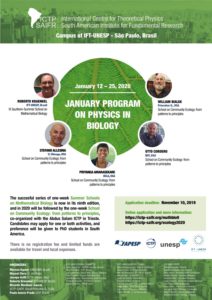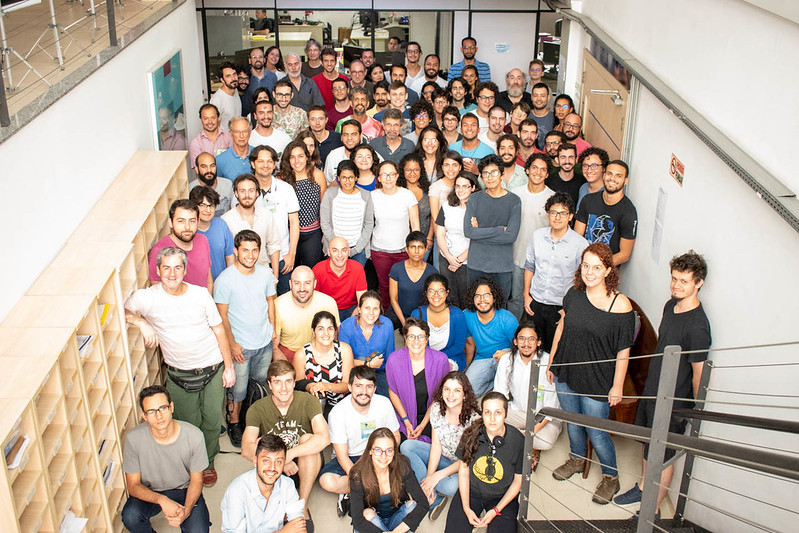School on Community Ecology: from patterns to principles
January 20-25, 2020
São Paulo, Brazil
ICTP-SAIFR/IFT-UNESP

Home
From the bacteria in our guts, to the plants in the Amazon rainforest, ecological communities are made of many individuals and populations that coexist and interact in the same environment. Despite the complexity of the interactions between species and with the environment, often these communities display regularities in key macroscopic properties, such as their patterns of abundance, composition and the interaction network.
A quantitative understanding of the processes and mechanisms that shape the composition and diversity of such communities requires advanced tools and methods borrowed from statistical physics and applied mathematics. The school will consist in advanced courses on topics in the dynamics and structure of ecological communities, which aims both at introducing students to up-to-date question of the field as well as introduce useful mathematical tools.A particular focus will be given to the emergence of macroecological patterns (“laws”) and to their connection to fundamental mechanisms.
This activity will be preceded by the ‘IX Southern-Summer School on Mathematical Biology‘. Candidates may apply either for one or both schools, and preference will be given to graduate students in South America. Advanced undergraduate students are also welcome to apply. There is no registration fee and limited funds are available for travel and local expenses.
Round table
In this activity, students will have the opportunity to ask more general questions to the lecturers of the school in a relaxed and very informal atmosphere. Students should feel free to ask several questions and establish a dialogue with the lecturers. Questions may range from research-oriented to more career-development focused topics.
Satisfaction survey:
- click here
Lecturers:
- Stefano Allesina (U. Chicago, USA): A tour of the Generalized Lotka-Volterra Model – COURSE MATERIAL
- Priyanga Amarasekare (UCLA, USA): Non-linearity, variability and diversity: an integrative perspective
- Otto Cordero (MIT, USA): Microbial communities
- William Bialek (Princeton U., USA): Statistical physics of biological systems: From molecules to minds
Seminars:
- Ricardo Martinez-Garcia (ICTP-SAIFR/IFT-UNESP, Brazil): Ecological significance of imperfectly synchronized collective behaviors
- Jacopo Grilli (ICTP-Trieste, Italy): Laws of diversity and variation in microbial communities
Short Seminars:
- Sara Mortara (INMA – Jardim Botânico Research Institute, Brazil): Community ecology: From Patterns to the big four Processes
- Marina C. Rillo (University of Oldemburg, Germany): Species Competition: linking theory and data
- Débora Princepe (UNICAMP, Brazil): Modeling the Mito-nuclear Coevolution
Organizers:
- Marcus Aguiar (UNICAMP, Brazil)
- Jacopo Grilli (ICTP-Trieste, Italy)
- Roberto Kraenkel (IFT-UNESP, Brazil)
- Ricardo Martinez-Garcia (ICTP-SAIFR/IFT-UNESP, Brazil)
- Paulo Inácio Prado (IB-USP, Brazil)
Poster
Program
School program: PDF updated on January 19, 2020
Videos and Files
2020-01-20
2020-01-21
2020-01-22
2020-01-23
2020-01-24
2020-01-25
asdasdasd
Sara Mortara: Community ecology: From Patterns to the big four Processes
Marina C. Rillo: Species Competition: linking theory and data
Débora Princepe: Modeling the Mito-nuclear Coevolution
Photos
Additional Information
Registration: ALL participants should register, except those who already registered for the ‘IX Southern-Summer School on Mathematical Biology’. The registration will be on January 20 (Monday) at the institute at 10:00 am.
BOARDING PASS: All participants, whose travel has been provided or will be reimbursed by the institute, should bring the boarding pass upon registration, and collect an envelope to send the return boarding pass to the institute.
List of Participants: Updated on January 17, 2020
Visa information: Nationals from several countries in Latin America and Europe, Australia, Canada, Japan and USA are exempt from tourist visa. Please check here which nationals need a tourist visa to enter Brazil.
Accommodation: Participants, whose accommodation will be provided by the institute, will stay at The Universe Flat. Hotel recommendations are available here
How to reach the Institute: The school will be held at ICTP South American Institute, located at IFT-UNESP, which is across the street from a major bus and subway terminal (Terminal Barra Funda). The address which is closer to the entrance of the IFT-UNESP building is R. Jornalista Aloysio Biondi, 120 – Barra Funda, São Paulo. The easiest way to reach us is by subway or bus, please find instructions here.
Yellow fever vaccination is recommended for travellers going to Brazil. Note that the vaccine needs to be taken at least ten days before the trip to be effective. Information: https://wwwnc.

